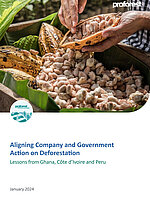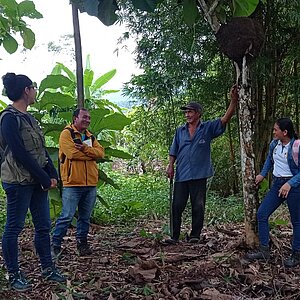#GenerationRestoration: Nature-positive Supply Chains

The IKI presented its concepts for nature-positive supply chains at this year’s Climate Change Conference of the Global Landscape Forum.
10 million hectares of forest are lost throughout the world every year. It is notable here that only seven agricultural products are responsible for a quarter of the global loss of forest areas: the production of beef, palm oil, soy, coffee, cocoa, wood and natural rubber took up an area twice the size of Germany between 2001 and 2015 (World Resources Institute 2021).
The forest, however, is one of numerous ecosystems that provide us with fresh air, filtered water, food and medicine, and, as a fact of particular significance, trees store large quantities of carbon, helping to counteract climate change. As a result of deforestation and use as a monoculture, the ecosystem can no longer render these valuable services, but without healthy ecosystems and their services, we are unable to successfully counteract climate change and the extinction of species.
The call of the UN Decade for Ecosystem Restoration (2021-2030) therefore goes out to each and every one of us. As, whether you are a manufacturer or a consumer, a supplier, a small-hold farmer or a company, we can only protect and restore our ecosystems if we join together. So the question is, is it possible to create nature-positive supply chains for agricultural products that are subject to strong demand all over the world? Can they be a successful instrument of the UN Decade in actively regenerating ecosystems?
The IKI implementing organisations Proforest, IUCN and OroVerde presented their innovative concepts for nature-positive supply chains at this year’s Climate Change Conference of the Global Landscape Forum (November 5th-7th, 2021). At the event Rethinking Supply Chains – Transforming Business Practices to Enable Ecosystem Restoration, they discussed with business representatives how to identify risks along the supply chain, which planning instruments are helpful in a landscape approach and how all local groups and communities can become involved.
The conclusion from the knowledge gained was that nature-positive supply chains are not only possible, but also help companies to prepare themselves to combat future risks that may emerge from climate change, for example. In addition to corporate commitment, however, politics must direct the course of this development using appropriate laws and financial incentives. A clear message went out to the decision-makers at the simultaneous Climate Change Conference held in Glasgow (COP26), stating that the transformation of supply chains needs to be embedded in the transformational change of our present-day financial and economic system. Only then will the worth of social and natural capital be acknowledged and our dependence on healthy ecosystems understood at last.
For more information on this topic, please refer to the White Paper of the event.
The link has been copied to the clipboard
Contact
IKI Office
Zukunft – Umwelt – Gesellschaft (ZUG) gGmbH
Stresemannstraße 69-71
10963 Berlin
Further information
IKI engagement for the restoration of ecosystems
Global Landscapes Forum (Website)
Rethinking supply chains. Transforming business practices to enable ecosystem restoration (Whitepaper)










![[Translate to English:]](/fileadmin/_processed_/0/1/csm_20230712_AdobeStock_604924276_Baum_Hand_0d56a1fbb6.jpeg)






